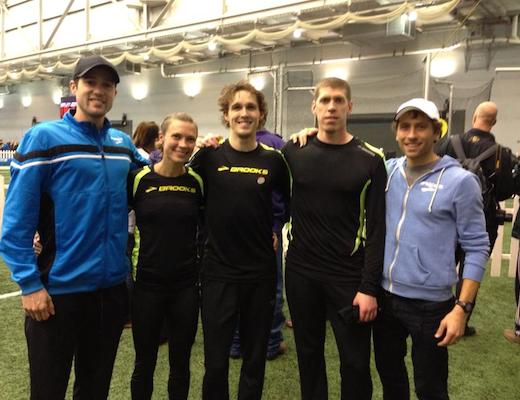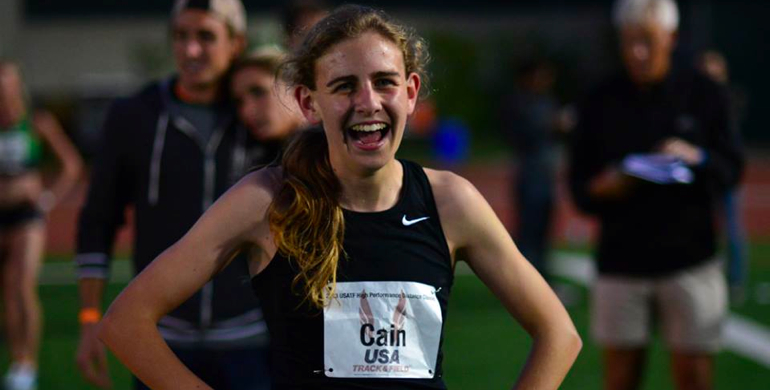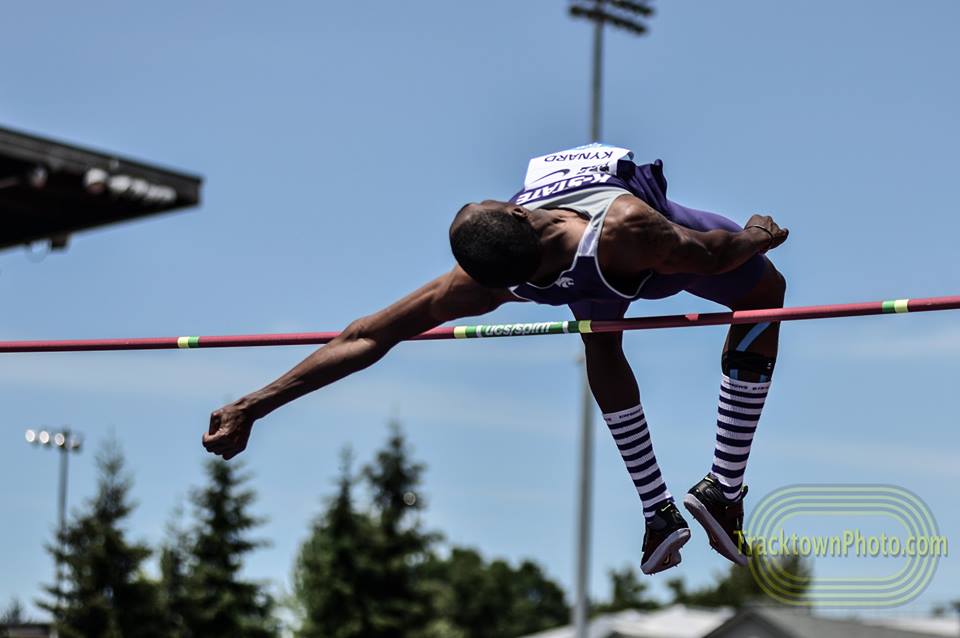5 Questions with Danny Mackey
Pat Price | On 05, Nov 2013
photo: Facebook
Welcome back to 5 Questions, where we pick the brains of people from all areas of the running scene. Today, we were lucky enough to catch up with the coach of the Brooks Beasts, Danny Mackey. Follow him on Twitter @dtmack
5 Questions with Danny Mackey
1. Daily Relay: You have amassed quite a talented group of runners up in Seattle. When did you get the idea to form this group and what’s your background as a runner and coach?
Danny Mackey: Thanks, yeah, they are a super talented group of runners, as well as great people. I am very thankful to have the opportunity to work with them on a daily basis as they try to hit their goals. The idea came from Jesse Williams (Head of Sports Marketing at Brooks Sports) years ago before my time. He’s actually showed me a few emails from 6 years ago talking about the team. Jesse wanted to parallel the Beasts with the Hansons-Brooks group, since they are successful and the pioneers of bringing the team training model back to the United States. The difference is this group has a track focus and are based out of Seattle, where the Brooks world headquarters is located.
My background as runner started at Andrew High School in Illinois. I had a hall of fame coach in Joe Mortimer, who was as smart as much as he cared about us. That set the tone, which is why great high school coaches grow the sport. Out of the entire top 7 from my senior year, all of us are still involved with the sport to some capacity. We trained hard (for us that was 40-50 miles per week), but everything was focused & intentional…and we had fun. Time wise, I ran 14:46 for XC (3 miles) and 1:58 for the 800. Then I went to Eastern Illinois University. I had another set of great coaches in John McInerney and Tom Akers. Though, as an athlete I really struggled in college. If you think of an injury or illness I had it. From nearly killing myself on mountain bike to passing out in the middle of a country road from having the worst case of mono you’ve ever seen. But, I learned a lot about striving for goals and dealing with the frustration of failing OR not even having the chance to try to get those goals. I also met some of the best teammates and friends I could have imagined.
After EIU, I went to grad school at Colorado State and I was fortunate to live with a few track studs and I started to coach myself. Even though I was literally working 80 hours a week between school, research, teaching and coaching, I was able to qualify for the Olympic Trials in the marathon. So that set me off to the Hansons, but I probably had the shortest contract ever there! I need to ask Kevin and Keith what they thought of me, but to be honest, up until this year I actually regretted that decision. I was so focused on work (I got a teaching job at Parkland College, teaching anatomy and kinesiology which was why I left) that I missed the small window of time to really train and see what I could do. But if it wasn’t for work experience, I may not have landed this professional coaching job, so who knows.
Coaching wise, I have always wanted to coach. Which made it frustrating for all my coaches. I was very close with my coaches, but I was definitely a pain in the butt because I could not shut off asking why we did everything we did or coming up with other ideas or suggestions (most which were admit-tingly dumb). But I listened to them 100% and would run myself into the grave if they wanted me to, so I was not the worst athlete to have! I went to grad school to study Exercise Physiology and Biomechanics with the sole goal of teaching and coaching at the university or professional level. But, I did not know how political that world was at the age of 22 (I still do not understand how political track and field is and hope I never do, but that’s for another discussion). If I told you how many NCAA jobs I applied for and didn’t get an interview at (217 jobs) you would laugh. BUT I was fortunate to land a great job working at NIKE in their Sports Research and Innovation lab. Here, I got to work with the smartest performance scientists and best athletes in the world on a daily basis. I stayed at NIKE for a while, then moved over to ADIDAS to work exclusively with their elite professional athletes on training and product innovations. Then I went to PUMA and was a global product line manager for their performance running line. All the while though I was coaching track athletes on top of working at these companies. It was where my heart and passion was focused.
2. Daily Relay: The Brooks Beasts TC includes athletes from other shoe companies as well. Was there any issues making your group available to non-Brooks athletes?
Danny Mackey: Not really. Currently, I am only a contracted employee for Brooks, hired out to coach the Brooks Beasts Track Club. The small number of athletes we have that are from other companies, I either knew beforehand or they reached out to me specifically to join the training group. I do not actively recruit non-Brooks athletes. This unconventional approach has worked out well for the Brooks Beasts as well as the Non-Brooks runners because they still function as a team and they bring the best out in each other in training and competing. I get the slight confusion from a marketing prospective, but at the end of the day if a Nike or Adidas athlete is getting the job done on the track because of joining this group, then they are happy. Plus, like I said, it helps the Brooks Beasts perform better so it’s a win-win.
3. Daily Relay: Every coach seems to be known for their certain style when it comes to coaching methodology. What kind of direction are you going with your coaching and who were/are some coaches you respect?
Danny Mackey: I approach everything from the perspective of the athlete first. Which sounds pretty basic, but I have to check myself daily to make sure every decision needs to be in the best interest of the team first and foremost. I have met and heard stories about way too many coaches that think they are a Godsend to the sport and in turn make their athletes successes about them. If I turn into that coach, I hope an athlete calls me out immediately or I get fired, because that person should not be around athletes. At some point, myself, coaches, agents, sports marketing managers, etc. should look at a professional athlete with admiration and understand at a fundamental level, they are simply genetic badasses and we would not have jobs if people did not think it was cool to see them show off these talents.
Methodology wise, I appreciate science and the “how” or “why” certain stimulus’s can influence performance. With this appreciation my methodology seems to evolve from year to year as I try and read or consult experts on a regular basis. In general we periodize our training, and are intentional with weights, drills, plyo’s and make sure there is a reason for every single thing we do and understand everything we do mentally and physically matters when it comes time to race. Oh….and we try and have fun in the process. Training to be an Olympian doesn’t mean we have to be robots 24/7. Coaching wise, I respect John Cook for his willingness to use various training modalities and training distance runners as “athletes,” not just people that run miles. I like Mark Wetmore’s approach on having a purpose for workouts and also pushing the boundaries of his athletes. Wetmore is also interesting because if you listen to his interviews (and I coach 2 of his former athletes) he has a even tempered analytical approach to carrying his athlete’s training over to racing well. Next would be Renato Canova. He is brilliant with the overall structure to periodizing training athletes of multiple distances. The guy can coach an 800 female to a male marathoner. That is a rare talent as a coach. Last would be Phil Jackson (the former Chicago Bulls and LA Lakers coach). He did a great job of managing personalities and getting those teams to actually function like a team. At the professional level, it is as much about deciding how many miles to run or how fast to run a tempo, as it is to deal with the daily struggles of these athletes AND manage the business side of he sport. Phil Jackson didn’t do the best job on the business side because he butted heads with management, but I like to think it was because he was looking out for his athletes first.
4. Daily Relay: The group had a very strong 2013. What have been some of your highlights as a coach thus far?
Danny Mackey: Thanks Pat. Watching Wizzo (Mark Weiczorek) win the Karlstand Grand Prix at the end of the season was a highlight because he hit a little fatigue slump right around USA’s and it carried over to Europe. But he stayed in it training wise mentally and physically, and won a stacked race to close out the season. I love it when athletes’ show gameness. If I had to pick one trait I look for, it is gameness, because I think athletes have it or they don’t. Then, Katie Mackey winning Oxy was fun because she had to battle through the line to pull out the win and that was something we were working on from the previous year. Brie setting a big PR in the 1500 (4:05.6) over in Heusden was great because that 1500 has been a gorilla on her back for a few years. She won NCAA’s as a sophomore in college and was not able to get her 1500 time down since. But my favorite part was AFTER the race, because she was all fired up since she knew there was a little more there in the race. Brie got some swagger and confidence after and it showed in her next races in Europe (winning Dublin, 2nd at Karlstand, and turning around 48 hrs later to race the London DL last minute in the 3k.) Off the track, signing Riley Masters, Cas Loxsom and Deborah Maier. I have a ton of sympathy for NCAA coaches, because recruiting is not fun and I only had a few athletes to get! But it was a great day in Des Moines having those 3 sign. We couldn’t ask for 3 better Baby Beasts (I think Cas or Jessica Tebo gets credit for coining that name).
5. Daily Relay: What are some of your goals for the group this year and in the future?
Danny Mackey: I would like to sign 1 or 2 more guys to round out the men’s team. We just signed Jamie Cheever and Angela Bizzarri, as well as added Phoebe Wright and Erica Moore, but there are a few males out there that I think would be a good fit. Training-wise, this is the time of the year where we focus on the fundamentals. So we’ll race at San Jose and hopefully Club XC Nationals, but the focus is training right now. Next year, it is simply running fast. I do not even know if we will go to USA’s to be honest, so as of right now, it will be racing fast, getting into Diamond Leagues and getting that process down as we head into 2015 and 2016, when the World Champs and the Olympics become the focus.
Update: Click here to read Kevin Sully’s 5/26/15 piece, “Danny Mackey Got His Dream Job–Now the Hard Part”
If you enjoy 5 Questions, check out the archive of previous interviews over at Writing About Running



















Comments